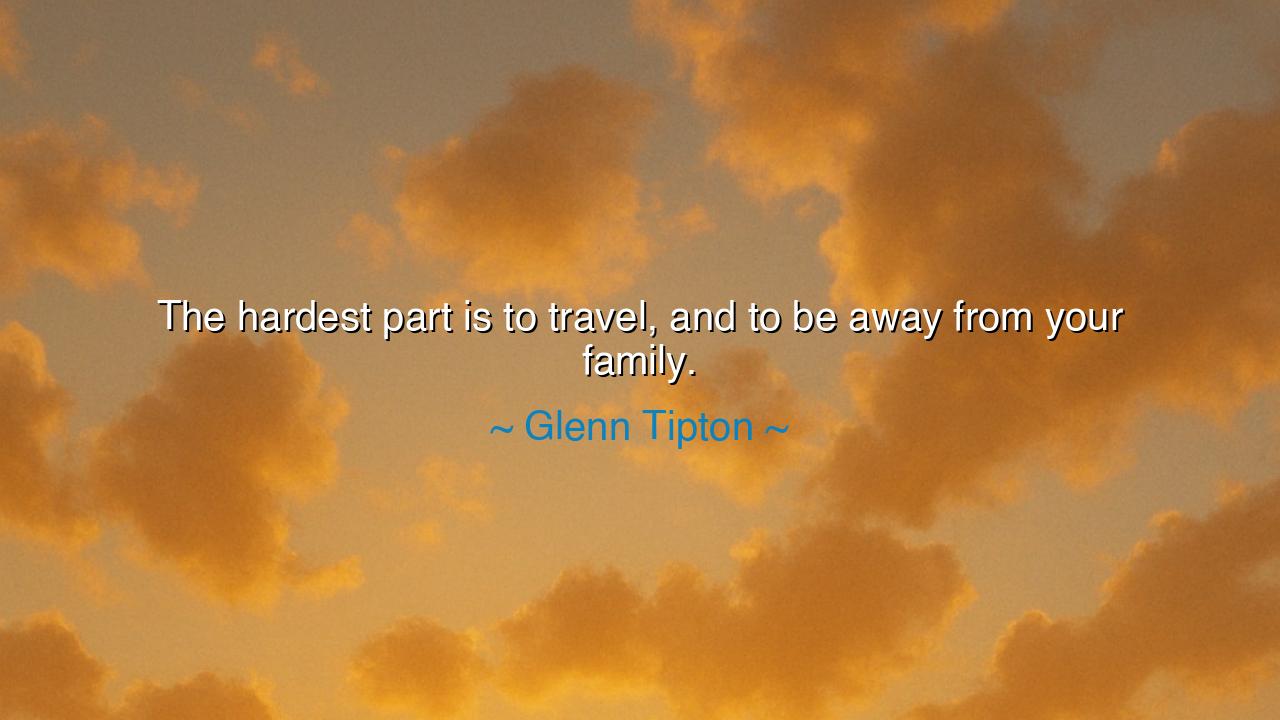
The hardest part is to travel, and to be away from your family.






Hear, O listeners, the words of Glenn Tipton, who bore the life of a traveling musician and confessed with honesty: “The hardest part is to travel, and to be away from your family.” These words, though simple, strike deep into the heart, for they reveal the sorrow that hides behind journeys of glory. To the world, travel often appears as freedom, adventure, and triumph; yet to the soul, it carries a hidden cost—the absence of those we love most dearly.
The ancients understood this paradox well. Warriors, merchants, and messengers were honored for the roads they traveled and the lands they conquered, yet all sang laments of separation from their homes. To cross mountains and seas is a noble endeavor, but to miss the embrace of one’s family is a wound that no wealth or fame can heal. Thus Tipton’s words remind us that even in modern times, the oldest truth remains: to be torn from one’s hearth and kin is the heaviest burden of all.
Consider the story of Odysseus, hero of Homer’s epic. For ten long years he fought at Troy, and for ten more he wandered the seas, but the hardest part of his trials was not the battles nor the storms—it was the distance from Penelope and Telemachus, the family he longed for with every breath. Even surrounded by riches and kingdoms, he yearned only for the warmth of home. Like Tipton, Odysseus teaches us that travel without family near is a victory tinged with sorrow.
Tipton’s words also reveal the hidden sacrifice of those who pursue their callings. Musicians, soldiers, workers in far-off lands—all may achieve greatness, yet often at the price of absence from loved ones. To the audience, the stage glows with triumph; to the traveler, the nights echo with longing. The lesson here is not to scorn ambition, but to recognize the weight it carries. Every journey away from home is not only a test of endurance but also a test of love.
Yet within this sorrow lies a noble truth: absence sharpens the bonds of affection. The heart learns to cherish what it lacks, and distance magnifies the value of presence. Families separated by travel often grow stronger in spirit, for each reunion becomes a festival of gratitude. As the Roman poet once said, “Parting is sweet sorrow,” for it teaches us to treasure that which is easily taken for granted. Thus, hardship itself can refine love into something enduring and unbreakable.
What then is the lesson for us? It is this: let not the pursuit of ambition cause us to neglect those whose love sustains us. If we must travel, let us return often. If we must be absent, let us keep the ties alive through word, thought, and remembrance. Never allow distance to become neglect, for the road may be long, but the heart must always point homeward.
Practically, this means carving out sacred time for family even amid journeys. It means writing, calling, sending tokens of love, and returning whenever possible. It means recognizing that no achievement in the world can replace the bonds of family, and that the true measure of success is not applause from strangers but the enduring love of those who wait at home.
So let this truth be carried forward: Travel tests the body, but absence tests the heart. If we hold fast to love, no distance can sever us. If we forget it, no triumph can fulfill us. Therefore, let all who journey remember Tipton’s wisdom: the road is hard, but the hardest part is always the distance from those we call our own.






AAdministratorAdministrator
Welcome, honored guests. Please leave a comment, we will respond soon